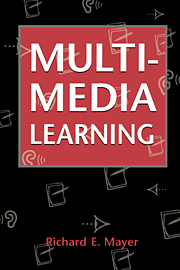Book contents
- Frontmatter
- Contents
- PREFACE
- 1 The Promise of Multimedia Learning
- 2 Multimedia Instructional Messages
- 3 A Cognitive Theory of Multimedia Learning
- 4 Multimedia Principle
- 5 Spatial Contiguity Principle
- 6 Temporal Contiguity Principle
- 7 Coherence Principle
- 8 Modality Principle
- 9 Redundancy Principle
- 10 Individual Differences Principle
- 11 Principles of Multimedia Design
- REFERENCES
- AUTHOR INDEX
- SUBJECT INDEX
8 - Modality Principle
- Frontmatter
- Contents
- PREFACE
- 1 The Promise of Multimedia Learning
- 2 Multimedia Instructional Messages
- 3 A Cognitive Theory of Multimedia Learning
- 4 Multimedia Principle
- 5 Spatial Contiguity Principle
- 6 Temporal Contiguity Principle
- 7 Coherence Principle
- 8 Modality Principle
- 9 Redundancy Principle
- 10 Individual Differences Principle
- 11 Principles of Multimedia Design
- REFERENCES
- AUTHOR INDEX
- SUBJECT INDEX
Summary
Modality Principle: Students learn better from animation and narration than from animation and on-screen text; that is, students learn better when words in a multimedia message are presented as spoken text rather than printed text.
Theoretical Rationale: When pictures and words are both presented visually (i.e., as animation and text), the visual/pictorial channel can become overloaded but the auditory/verbal channel is unused. When words are presented auditorily, they can be processed in the auditory/verbal channel, thereby leaving the visual/pictorial channel to process only the pictures.
Empirical Rationale: In four of four tests, learners who received animation and narration performed better on tests of retention than did learners who received animation and on-screen text. In four of four tests, learners who received animation and narration performed better on tests of transfer than did learners who received animation and on-screen text.
INTRODUCTION
Does Modality Matter?
Suppose you wanted to design a multimedia lesson to be presented via a computer system. Suppose the lesson involves a scientific explanation such as how car brakes work, how pumps work, or how lightning storms develop. Furthermore, suppose your goal is to help learners understand the explanation so that they will be able to answer problem-solving transfer questions that require applying the presented material to new situations. How would you proceed?
- Type
- Chapter
- Information
- Multimedia Learning , pp. 134 - 146Publisher: Cambridge University PressPrint publication year: 2001
- 1
- Cited by



